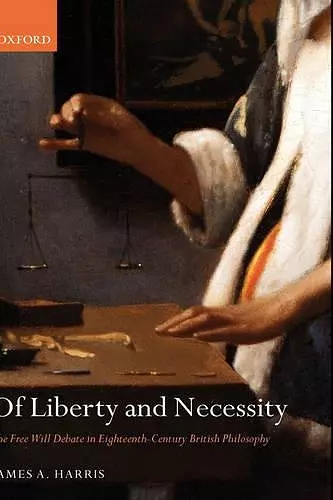Of Liberty and Necessity
The Free Will Debate in Eighteenth-Century British Philosophy
Format:Hardback
Publisher:Oxford University Press
Published:19th May '05
Currently unavailable, and unfortunately no date known when it will be back
This hardback is available in another edition too:
- Paperback£56.00(9780199234752)

In Of Liberty and Necessity James A. Harris presents the first comprehensive account of the free will problem in eighteenth-century British philosophy. Harris proposes new interpretations of the positions of familiar figures such as Locke, Hume, Edwards, and Reid. He also gives careful attention to writers such as William King, Samuel Clarke, Anthony Collins, Lord Kames, James Beattie, David Hartley, Joseph Priestley, and Dugald Stewart, who, while well-known in the eighteenth century, have since been largely ignored by historians of philosophy. Through detailed textual analysis, and by making precise use of a variety of different contexts, Harris elucidates the contribution that each of these writers makes to the eighteenth-century discussion of the will and its freedom. In this period, the question of the nature of human freedom is posed principally in terms of the influence of motives upon the will. On one side of the debate are those who believe that we are free in our choices. A motive, these philosophers believe, constitutes a reason to act in a particular way, but it is up to us which motive we act upon. On the other side of the debate are those who believe that, on the contrary, there is no such thing as freedom of choice. According to these philosophers, one motive is always intrinsically stronger than the rest and so is the one that must determine choice. Several important issues are raised as this disagreement is explored and developed, including the nature of motives, the value of 'indifference' to the will's freedom, the distinction between 'moral' and 'physical' necessity, the relation between the will and the understanding, and the internal coherence of the concept of freedom of will. One of Harris's primary objectives is to place this debate in the context of the eighteenth-century concern with replicating in the mental sphere what Newton had achieved in the philosophy of nature. All of the philosophers discussed in Of Liberty and Necessity conceive of themselves as 'experimental' reasoners, and, when examining the will, focus primarily upon what experience reveals about the influence of motives upon choice. The nature and significance of introspection is therefore at the very centre of the free will problem in this period, as is the question of what can legitimately be inferred from observable regularities in human behaviour.
James Harris's book, Of Liberty and Necessity, is a remarkable achievement. It is the first book to provide a true chronicle of the rich and intricate discussion in early modern Britain of the relationship between freedom and necessity...The best complement that can be paid to a work of philosophy - in contrast to, say, a novel - is not to just read it, but to use it to do more philosophy. Anyone who reads Harris's wonderful book will find themselves wanting to pay Harris that very complement. * Gideon Yaffe, Mind *
It is a virtue of Harris' book to have presented the positions in the British eighteenth-century free will debate so extensively and clearly * Sean Greenberg, Notre Dame Philosophical Reviews *
ISBN: 9780199268603
Dimensions: 242mm x 163mm x 21mm
Weight: 564g
280 pages